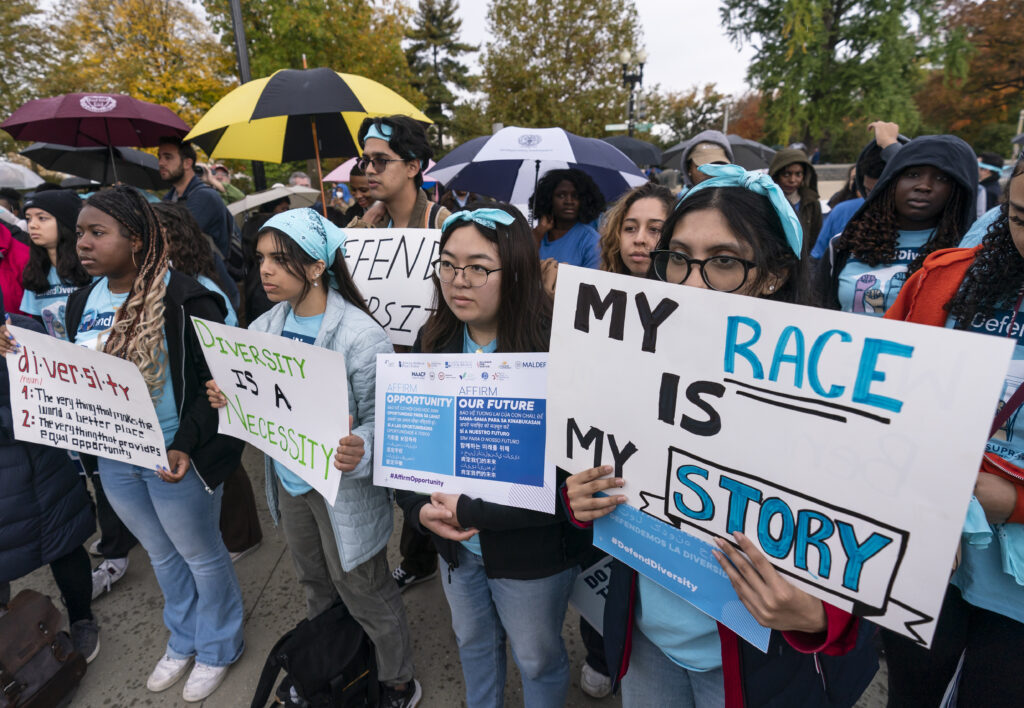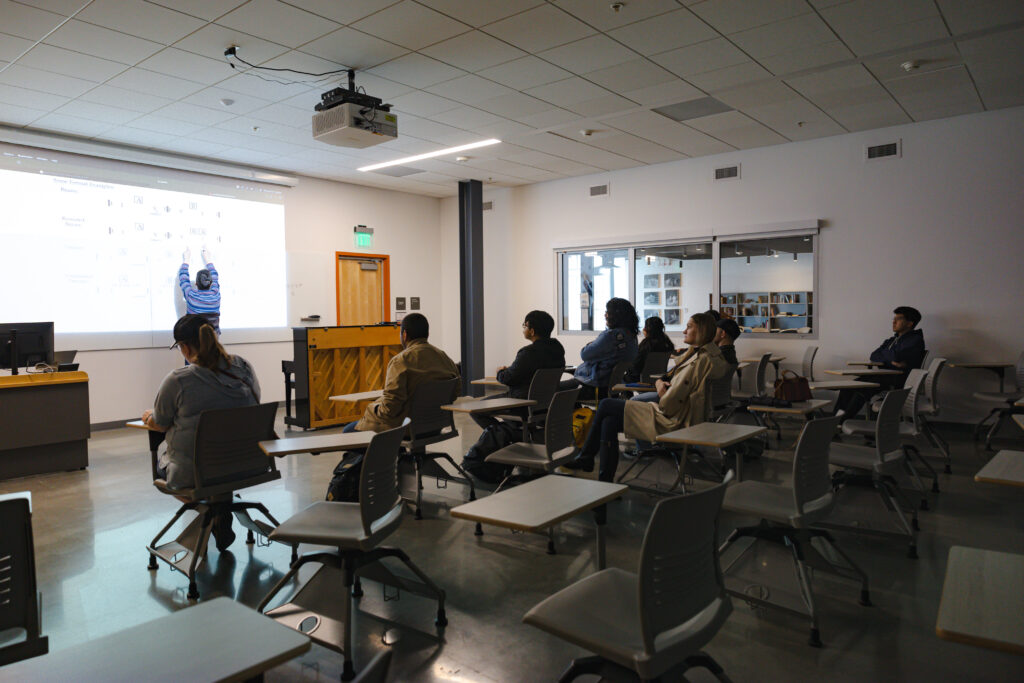
Black teachers: How to recruit them and make them stay

Lessons in higher education: What California can learn

Keeping California public university options open

Superintendents: Well-paid and walking away

The debt to degree connection

College in prison: How earning a degree can lead to a new life

The U.S. Supreme Court on Thursday struck down affirmative action policies at colleges, ruling that race-conscious admissions policies at Harvard University and the University of North Carolina are unlawful.
“The student must be treated based on his or her experiences as an individual — not on the basis of race,” Chief Justice John Roberts wrote in the majority opinion. “Many universities have for too long done just the opposite. And in doing so, they have concluded, wrongly, that the touchstone of an individual’s identity is not challenges bested, skills built, or lessons learned but the color of their skin.”
The court’s decision will force colleges across the country to change their admission policies, including private universities in California that are free to consider race in admissions.
The state’s public universities are already banned from considering race in admissions because of a 1996 ballot measure. University of California officials previously warned the court that, without affirmative action, its nine undergraduate campuses have been unable to enroll a student body that is sufficiently racially diverse.
California Gov. Gavin Newsom condemned the court’s ruling in a statement Thursday, saying the court’s conservative majority changed the law “just because they now have the votes to do so, without any care for the costs to society and students around the country.”
The court’s vote was 6-3 in the North Carolina case, with the conservative majority ruling against the programs. The vote was 6-2 in the Harvard case, from which Justice Ketanji Jackson Brown recused herself as a former member of Harvard’s board of overseers.
Several of California’s private colleges were frustrated by the court’s ruling.
At Occidental College, a liberal arts college in Los Angeles, President Harry Elam said the decision was “deeply disappointing” while noting that race-conscious admissions policies “have sought to promote diverse and multidimensional learning environments for the benefit of all students.” Carol Folt, the president of the University of Southern California, in a statement, called the ruling “very disappointing” but vowed that the college would maintain its commitment to a campus that is “welcoming, diverse and inclusive.” Santa Clara University President Julie Sullivan said the ruling would limit that college’s “freedom to recognize aspiring and current students as ‘whole’ human beings.”
Meanwhile, the top leaders of California’s three public higher education segments — UC, the community college system and the 23-campus California State University — expressed disappointment in the court’s decision but said they would “continue to support programs and practices” that intend to ensure their colleges are “reflective of California’s rich and dynamic diversity.”
“We remain committed to creating educational opportunities for all Californians so that they can reach their full potential and so that all California communities can thrive,” they added. The three officials are Michael Drake, UC’s systemwide president; Jolene Koester, CSU’s interim chancellor; and Sonya Christian, chancellor of the community college system.
That sentiment from California’s higher education leaders was encouraging to Christopher Nellum, the executive director of the Education Trust-West, a nonprofit that advocates for equity in education. Nellum said it’s important that “young people of color know they’re still welcome” at the state’s top universities, despite the court’s ruling.
“I think it’s important that they continue to message in the way that they did today. California needs a diverse, educated populace,” he said.
In the North Carolina case, the group Students for Fair Admission argued that the university admissions policies gave preference to Black, Latino and Native American students and discriminated against white and Asian applicants. In the Harvard case, the university was also accused of discriminating against Asian American students.
In a dissenting opinion Thursday, Justice Sonia Sotomayor invoked UC, noting that there was a decline in freshman enrollees immediately after the 1996 ballot measure, especially at the system’s most selective campuses, like Berkeley. She also wrote that the court’s decision would have a “devastating impact” on higher education.
“The majority’s vision of race neutrality will entrench racial segregation in higher education because racial inequality will persist so long as it is ignored,” Sotomayor wrote.

The overreliance on undersupported part-time faculty in the nation’s community colleges dates back to the 1970s during the era of neoliberal reform — the defunding of public education and the beginning of the corporatization of higher education in the United States. Decades of research show that the systemic overreliance on part-time faculty correlates closely with declining rates of student success. Furthermore, when faculty are… read more

Panelists discussed dual admission as a solution for easing the longstanding challenges in California’s transfer system.

A grassroots campaign recalled two members of the Orange Unified School District in an election that cost more than half a million dollars.

Legislation that would remove one of the last tests teachers are required to take to earn a credential in California passed the Senate Education Committee.
Comments (5)
Comments Policy
We welcome your comments. All comments are moderated for civility, relevance and other considerations. Click here for EdSource's Comments Policy.
Jim 10 months ago10 months ago
Perhaps Sotomayor would like to familiarize herself with the civil rights act of 1964. "SEC. 202. All persons shall be entitled to be free, at any establishment or place, from discrimination or segregation of any kind on the ground of race, color, religion, or national origin, if such discrimination or segregation is or purports to be required by any law, statute, ordinance, regulation, rule, or order of a State or any agency or political subdivision … Read More
Perhaps Sotomayor would like to familiarize herself with the civil rights act of 1964.
“SEC. 202. All persons shall be entitled to be free, at any establishment or place, from discrimination or segregation of any kind on the ground of race, color, religion, or national origin, if such discrimination or segregation is or purports to be required by any law, statute, ordinance, regulation, rule, or order of a State or any agency or political subdivision thereof.”
It seems she is unaware of it.
https://www.archives.gov/milestone-documents/civil-rights-act
Richard Golfer 10 months ago10 months ago
In California we have a great tool to incerase diversity in our colleges. We have 106 Community Colleges. If you goofed off in high school (I did), you can go to Community College; if a student attends community college, even if they graduate with a C average, they can easily transfer to state colleges (You need better grades to go to the more prestigious UC colleges, but not a lot better). Our community colleges … Read More
In California we have a great tool to incerase diversity in our colleges. We have 106 Community Colleges. If you goofed off in high school (I did), you can go to Community College; if a student attends community college, even if they graduate with a C average, they can easily transfer to state colleges (You need better grades to go to the more prestigious UC colleges, but not a lot better).
Our community colleges have great remedial programs to get students “ready” for four year colleges. The community colleges, in part, were created to increase diversity at state colleges and to give the children of low and middle income people a shot at attending state colleges and universities. The system in California has worked fabulously. Low-income kids today get Pell Grants and student loans to finance their way thru college, all kids.
I believe the best students should get admitted to the colleges frosh year, based on test score and grades, that is a fair system, but we have another way for kids to get admitted to college via the community college route, so all this hullabaloo about people of color getting the shaft on college admissions because of this Supreme Court decision is just a lot of sky-is-falling nonsense, at least it is in California.
I myself am a graduate of community college, so is my son; or family didn’t have a lot of money, but we both transferred and graduated from state colleges. State leaders created our great community colleges decades ago and the system works just great. All this hand-wringing over the Supreme Court ruling is ridiculous.
Dr. Bill Conrad 10 months ago10 months ago
The reality is that the educational playing field is tilted in favor of white children. White children get the highest quality teachers and best resources. Children of color get the least qualified teachers and the least resources! The student achievement data confirms it with only 1 out of 4 Black students able to do grade level math! This is not a student failure. It is a failure of teachers and administrators to teach. Children … Read More
The reality is that the educational playing field is tilted in favor of white children. White children get the highest quality teachers and best resources. Children of color get the least qualified teachers and the least resources!
The student achievement data confirms it with only 1 out of 4 Black students able to do grade level math! This is not a student failure. It is a failure of teachers and administrators to teach.
Children of color truly are educational refugees seeking relief from the educational ghettoes where they have been relegated.
Affirmative action is the least we can do to support our children of color.
The Supreme Court is a disgrace to our country. Totally bought out by a white billionaire class!
Richard Golfer 10 months ago10 months ago
A great ruling. I could not be happier. Discrimination on the basis of race is flat out wrong. It was well known there was a “quota” in the number of Asians students that got admitted at these elite colleges like Yale, Harvard and Princeton. The best students should get rewarded for their hard work, not punished for thier skin color. These unfair Affirmative action policies in the college admission process belong in the dust bin of history.
Replies
Dr. Bill Conrad 10 months ago10 months ago
You know what’s flat out wrong? 400 years of slavery. 150 years of Jim Crow. Today’s racism legacy where Black children get the least and white kids get the most! That’s what’s wrong. Affirmative action is just a small gesture to address those wrongs!